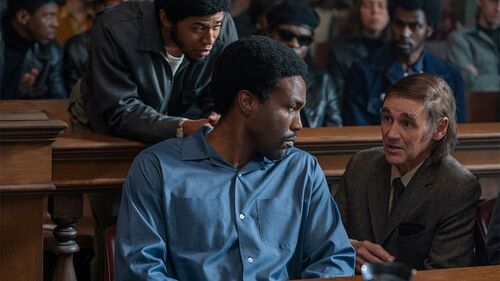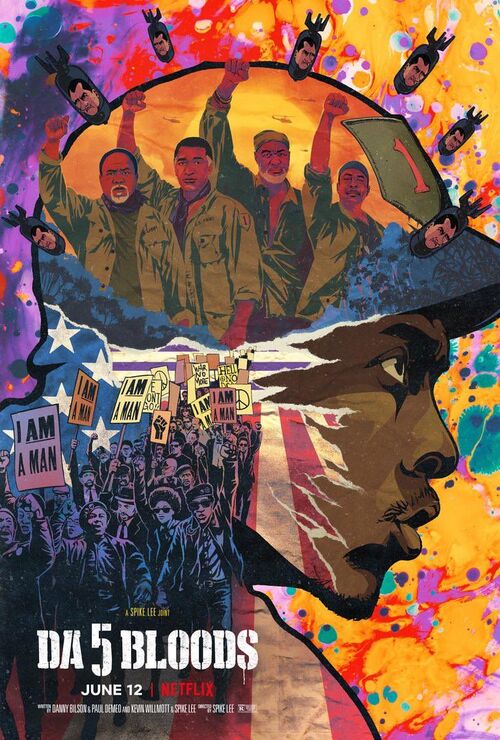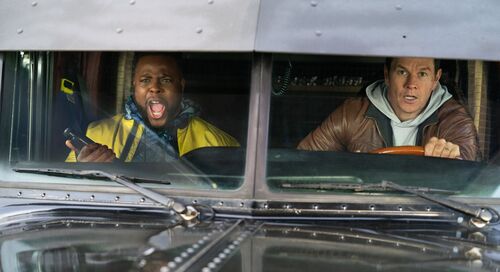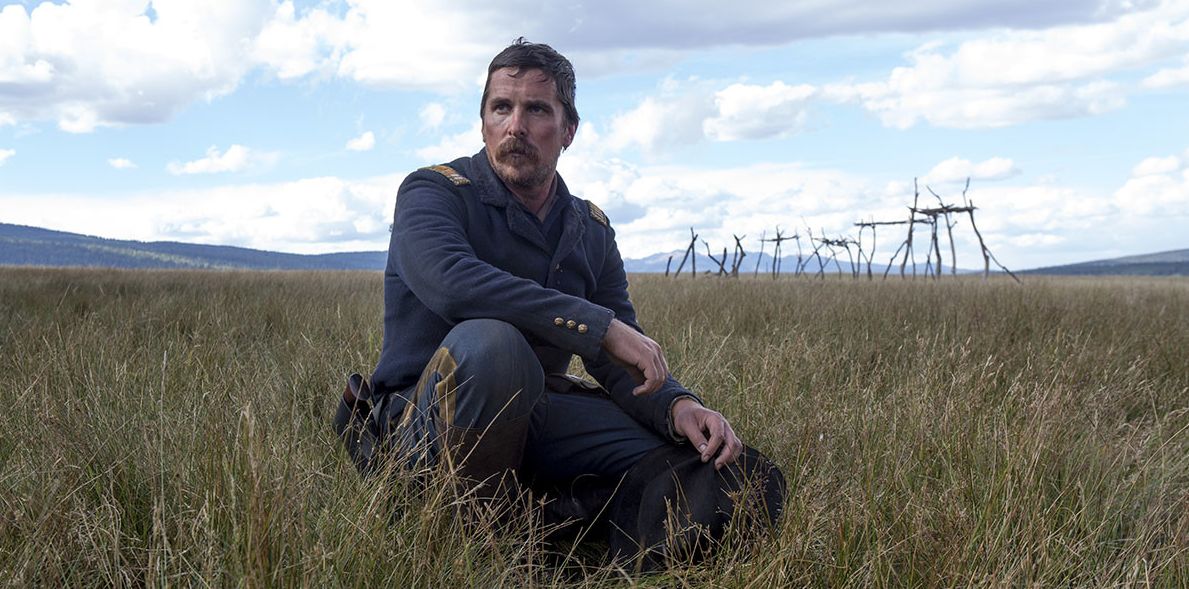
'Hostiles' review
 We are introduced to Scott Cooper’s ‘Hostiles’ with a solemn quote from D.H. Lawrence, assuring me that I was about to immerse myself in one of my favourite things in cinema – the Western that attempts to cut to the core of man’s tortured existence. What follows D.H. Lawrence’s affirmation of man’s marriage to violence is a prologue that lays the groundwork for this story.
We are introduced to Scott Cooper’s ‘Hostiles’ with a solemn quote from D.H. Lawrence, assuring me that I was about to immerse myself in one of my favourite things in cinema – the Western that attempts to cut to the core of man’s tortured existence. What follows D.H. Lawrence’s affirmation of man’s marriage to violence is a prologue that lays the groundwork for this story.
It’s actually a pleasantly sunny day in 1892 New Mexico. A family of five; father, mother and three kids are engaged in their day-to-day when about half a dozen Comanche Indians rumble towards their humble isolated abode. The mother grabs the kids, one of them not more than a few months old, and makes haste towards the top of a ridge for safety. The father grabs a rifle determined to defend his home from these raiders. In no time a bullet sears through him, then an arrow, then he is scalped and then finished off. The rest of the fleeing family is cut down one by one with only the mother surviving. She hides in the woods with her dead baby, bloodied, in her arms. Unfussy but brutal opening.
A less graphic form or brutality ensues in the next scene. Some us soldiers taunt and jeer at a scampering Native American man under the approving eyes of their commander, Captain Joe Blocker (Christian Bale), before lassoing him and dragging him in the dirt with their horses, all while his shrieking family (presumably) watches. This is a picture cinema has become more comfortable accepting as closer to the truth as time has gone by; Native Americans as one of the first victims of the vortex of exploitation on whose blood, amongst others, the foundations of America as we know it was built. At this point of the film, my primary interest was in how Cooper, who also wrote the script, would reconcile the two opening scenes against the weight of history.
The story kicks into gear when Blocker is presented with his last assignment before his retirement. The fort where he is based has served as a prison for the ailing Cheyenne chief Yellow Hawk (Wes Studi). To satisfy the whims of some progressives, Yellow Hawk is granted a pardon and the US president orders that he be escorted to his tribal home in Montana to die. But as we may have surmised by this point, Blocker harbours a deep contempt for Native Americans, so much so that he is ready to be court-martialled and stain his record than partake in the remotest act of kindness towards the Indians. When Blocker’s commanding officer (Stephen Lang) threatens his pension, his stance softens and he agrees.
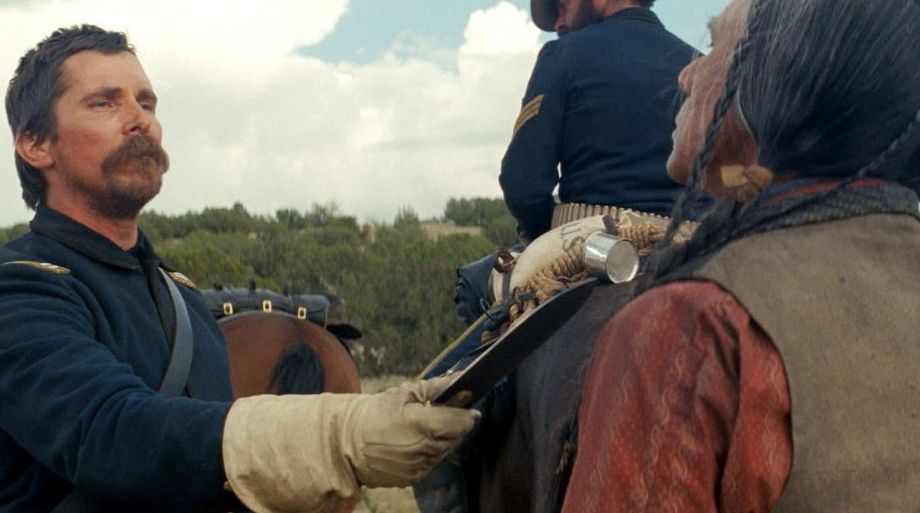
Blocker's concession seems to bring him physical pains. It can’t be overstated his hatred for the Indians. There is an almost surreal sequence with him under stormy skies letting out a flood of rage because of the dissonance forced on him. He has spent his life in army partaking in and being witness to brutality from both sides. All this has left him a bitter man with a black soul. Perhaps, Cooper tries too hard to enforce this point early on with an irritating journalist (Bill Camp) who seeks to stress to Blocker that there really is no difference between him and the “savages” he despises.
Bale really looks the part too. I think of Tom Hardy as the king of striking physicality with respect to performances (just check out this Al Capone pics). But Bale is up there, capable of just drowning himself in the small nuances and gears of a character. Blocker is on the surface your gruff worn down type, with his bushy moustache and beard. I don’t think he smiles all film. He believes deep down he will never again have cause to. The warmth of happiness is an alien concept to him. His charged eyes most encapsulate the prison of rage and hate he has locked himself in, which, every now and then, becomes a chamber of torment.
This final mission is our protagonist’s shot at finding some humanity. But this humanity is still a world away for Blocker. When it seems like he’s out of sight, Blocker orders that Yellow Hawk and the other Indian man in the party (Adam Beach) be shackled. There is something obscene with the sight of the black corporal, Henry (Jonathan Majors) putting a native American in chains upon Blockers command.
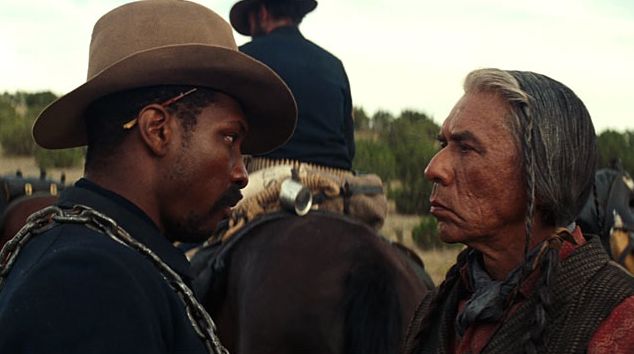
More offcuts of their pitiless existence emerge when they arrive at what’s left of the ranch we visited in film’s opening. In the smouldering remnants of home, the surviving mother, Rosalee Quaid (Rosamund Pike) sits with the remains of her three kids. She is a grief-stricken wreck, wallowing in in a pool of trauma and denial. I guess we could say the mood lightens a bit when Rosalee is finally able to take a step away from her grief. But the harsh realities of the world remain. The bloodthirsty Comanche are still in the area and they become the first test for our travelling party.
We don’t lose sight of the fact that the story is about how much of his humanity Blocker will be able to recover. The script is very generous to him almost appearing to give him endless layers. The other soldiers we spend time with him are almost reflections of some aspects of our protagonist.
Rising star Timothee Chalamet features here as the greenest of the bunch and I guess he tellingly represents Blocker’s innocence. Bizarrely without any backstory, but through a well-acted scene, we also learn that Henry and Blocker have a strong bond. When Blocker looks at Henry, I reckon he sees some semblance of the morality and Christian faith, which he perhaps once held dear. Another soldier, Sergeant Metz (Rory Cochrane), is also a longtime friend of Blocker’s. But he has been so worn down by life in the army and the violence accompanying it he seems dead inside. It’s the job, he says a few times with a trace of betrayal.
Then there’s solider (Ben Foster) accused of murder they meet later on, who is set to be hanged. Along the journey, Blocker’s team accept a bonus assignment to deliver this soldier to a town along their route to be tried. In the time spent with Foster, Cooper is again (over)emphasising Blocker’s history of violence with this forced comparison to the soldier on death row and it get's tedious at times, but the point is well made.
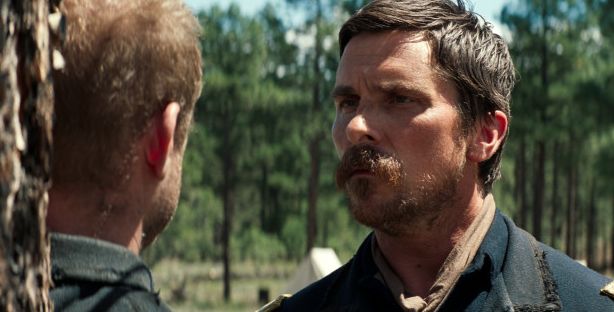
The depth afforded Blocker is well done from a story perspective but the balance promised in the first two scenes is not fulfilled. 'Hostiles' becomes less and less about relations between Americans and Indians and more about the white man’s inward attempts at redemption. Blocker has no real equal on the Indian side of things. Sure, Wes Studi’s Yellow Chief is supposed to provide that needed perspective but I was disappointed in his development. Perhaps he was a little too subtly handled, at times resembling a prop, along with the other native American characters. A more forceful sense of agency was needed to elevate this film to truly a great meditation on America’s past sins. But Cooper misses a trick.
This is especially frustrating because of the care taken to include substantial amounts of dialogue in the Cheyenne dialect, among other details. The irony is Bale as Blocker probably does more of the Cheyenne speaking, making you feel this was crafted as his showpiece. There is an air of dignity about Wes Studi’s performance; grave, venerable and seemingly spiritual towards the end of the film. But like 2017’s 'Wind River', this film would have been perfect if the script had done more for the Native American characters.
'Hostiles' will play as a terrific piece of cinema despite its story shortcomings. The film is beautifully shot. There is something about the superbly photographed landscape in a western that is simply humbling. It has to do with the vast landscape swallowing up the characters and the sense of natural scale and vulnerability it evokes.
Ultimately, Cooper says more about America as a whole that about Native Americans. He never gives the latter a real voice and the white man seems to always have the final say, like in the final act when Blocker's brutality punctuates the serene moments we spend with Yellow Hawk. Whilst the idea of the quintessential Western has evolved, the next truly great one will have to probe deeper, at a different layer of truth; one that gives us the unflinching perspective of the side that has oft been muzzled. 'Hostiles' does more than most, I will admit that, which makes you wonder why it remained coy to truly setting itself apart.
-
